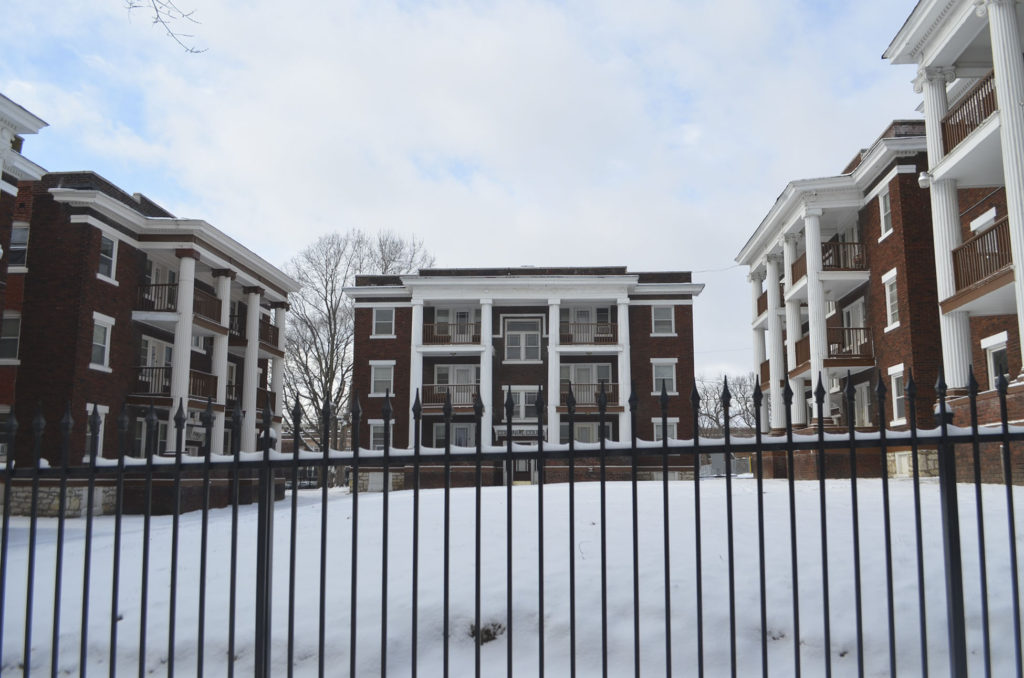
By Paul Thompson
Northeast News
January 5, 2017
KANSAS CITY, Missouri – Ongoing discussions between Kansas City University and the Pendleton Heights Neighborhood Association have left both sides feeling optimistic about the University’s planned expansion that, at least at one point, called for the demolition of several buildings that reside in the Pendleton Heights Historic District.
As part of the University’s planned construction of roughly 350 new parking stalls, it has recently purchased several properties on the east end of its campus: a 2.5 story home located at 517 Woodland built in 1909; a craftsman bungalow located at 1800 Brownell built in 1909; a 3-story colonnaded apartment located at 1810 Brownell built in 1908; a 2-story Queen Anne house at 1812 Brownell built in 1886; and the Colonial Court Apartments, a cluster of colonnaded, 3-story structures located between 502-520 Maple that were built in 1916.
Documents compiled by the City of Kansas City, Missouri in 2007 show that all of the properties being considered for demolition were deemed to be of at least “Good” Architectural Historic Integrity at the time. One of the structures, the Queen Anne located at 1812 Brownell, was deemed to be of “Excellent” Architectural Historic Integrity at the time, though it appears to have sustained significant damage in the interim. All of the properties being considered for demolition are at least 100 years old, and each of them was also rolled into the Pendleton Heights Historic District when it was expanded on May 22, 2008. None of the buildings, however, are individually listed on the Historic Register.
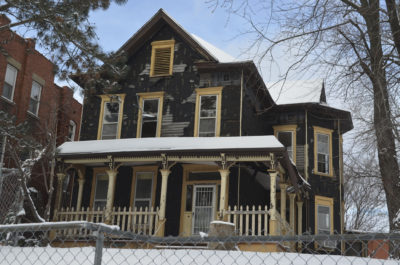
Brad Wolf of the KCMO Historic Preservation department confirmed the buildings that had been tabbed for demolition during a conversation earlier in the week.
“I believe the three buildings (two houses and an apartment) on the north side of Brownell, the Colonial Court Apartments, and one house on Woodland were all ones proposed for demolition,” said Wolf.
According to Wolf, if the original plan had been approved by the City Plan Commission, the Planning, Zoning, and Economic Development committee, and then the full City Council, the Master Planned Development District would have provided the University with ultimate zoning authority of its campus, superseding the Truman Plaza Area Plan, the Greater Downtown Area Plan, the recently-passed Independence Avenue Overlay Plan, and even the historic preservation guidelines contained within the Pendleton Heights Historic District.
“The process they are proposing is to use a Master Planned District with a set of guidelines that would override the local historic guidelines,” said Wolf, before the latest discussions between the school and Pendleton Heights.
“Actually, this is the first time that’s been requested,” Wolf added. “With these MPD’s, if there are underlying guidelines, we put in the plan that they have to follow them. They’re putting a lot of guidelines in the plan, but they’re saying that those are the only guidelines they have to follow. I basically just said that I would recommend that they go through the process that’s established.”
KCU attorney Jim Bowers, Jr., countered that the University is indeed going through established processes by filing a request to create a Master Planned Development District.
“The new development code does what the proponents of the development code said it should do, which is to specifically allow, when an MPD plan is the vehicle, to consolidate those processes into the MPD process,” said Bowers. “In this case, the new development code allows the development process to supersede the historic development process.”
Noting that the city regulatory process is often duplicative in nature, Bowers said that KCU is simply hoping to streamline the development process with its request for an MPD. He added that processes being utilized by KCU are exactly what the city intended when it developed its new development code.
“Ultimately the decision is going to be made by the City Council, as long as there is adequate review by the City Plan Commission,” Bowers said. “We’re taking those provisions and applying it to this process. We’re using the processes that are provided for in the new development code.”
While the Master Planned Development District is still expected to be seen by the City Plan Commission on Tuesday, January 17, recent discussions between KCU and Pendleton Heights have led to encouraging developments and potential changes, according to KCU Manager of Public Relations and Outreach, Elizabeth Alex. The two sides met for discussions on the afternoon of Tuesday, January 3.
“I would say that we had a very productive meeting and that we are really pleased with the ongoing communication and discussions we’ve had with the Pendleton Heights neighborhood,” said Alex. “We’re excited about what may transpire in the future.”
On the afternoon of January 4, the Pendleton Heights Neighborhood Association released a statement indicating that there had been “productive discussions” with Kansas City University regarding their master plan. The statement went on to say that the two sides are “working toward a solution that is in line with the fabric and values of our neighborhood and will be beneficial to the neighborhood and the university as we both continue to grow.”
Pendleton Heights Neighborhood Association President Jessica Ray echoed the statement’s sentiments during a conversation with the Northeast News on Thursday, January 5.
“We as Pendleton Heights have been having conversations about all of the parcels. We’re focused on the entire western end of our neighborhood,” said Ray. “We’re having productive conversations, and we’re optimistic that a compromise can be reached that benefits both of us.”
Before that Jan. 3 meeting, a social media firestorm had erupted over concerns that the university would raze the buildings to clear space for new parking on campus. KCU currently has 720 parking spots, according to its master plan, though the expansion would bring that number up to over 1,000 spaces. After one Northeast resident sent a letter of concern to various city leaders and the head of KCU’s capital improvement efforts, she received a response from Bowers.
In the letter, Bowers addresses some of the community concerns being discussed on social media. Regarding the state of the Colonial Court buildings, Bowers noted that they were in “disrepair” as a result of long-term deferred maintenance. He also spoke to neighborhood concerns about displaced residents of the apartments, stating that when KCU purchased the properties on Brownell (in October of 2016) and the Colonial Court apartments (December 2016), they were already vacant. In each of those 2016 purchases, according to Bowers, it was the previous property owners who approached KCU with an inclination to sell.
Before completing those deals, KCU looked into how the parcels would fit into their master plan and established conditions for the purchase.
“The conditions of each purchase is that KCU would only purchase the property if they were vacant,” said Bowers. “We’re not in the business of managing property. The lingo of the contract was free and clear of all tenancies.”
By Jan. 4, Alex was cautioning that the master plan could change even before the January 17 Plan Commission meeting, and that the University remained committed to the same kinds of historic preservation efforts it has prioritized in the past. As an example, Alex cited KCU’s recent renovation of the historic building on campus that once housed Children’s Mercy Hospital.
“We’ve been here for 100 years, and we feel like this is our neighborhood, too,” said Alex. “I feel like the renovation of the administration building to the tune of $14 million a year ago shows our commitment to renovation. It would have been cheaper and easier to rebuild.”
Even prior to the ongoing discussions between KCU and Pendleton Heights, one city leader who’d been informed of the debate expressed his hope that the two sides would continue working diligently towards a compromise.
“KCU is an important part of the neighborhood, but as an important part of the neighborhood, I think they should listen to neighborhood leaders,” said 3rd District Councilman Quinton Lucas. “KCU has been an actor in our community for decades, as have the neighborhood folks. I feel this is the sort of thing that should be resolved.”
While details related to the possible alterations of the master plan remain scant at this juncture, the fact remains that both sides have expressed public optimism about the discussions. In its statement, Pendleton Heights said that it plans to update residents about those discussions during its regular neighborhood association meeting on Tuesday, January 10, beginning at 7:00 p.m. at Kansas City University’s Butterworth Hall.
Meanwhile, the City Planner associated with the development, Olofu O. Agbaji, has indicated that he expects to have his full staff report for the City Plan Commission ready by Friday, January 13.
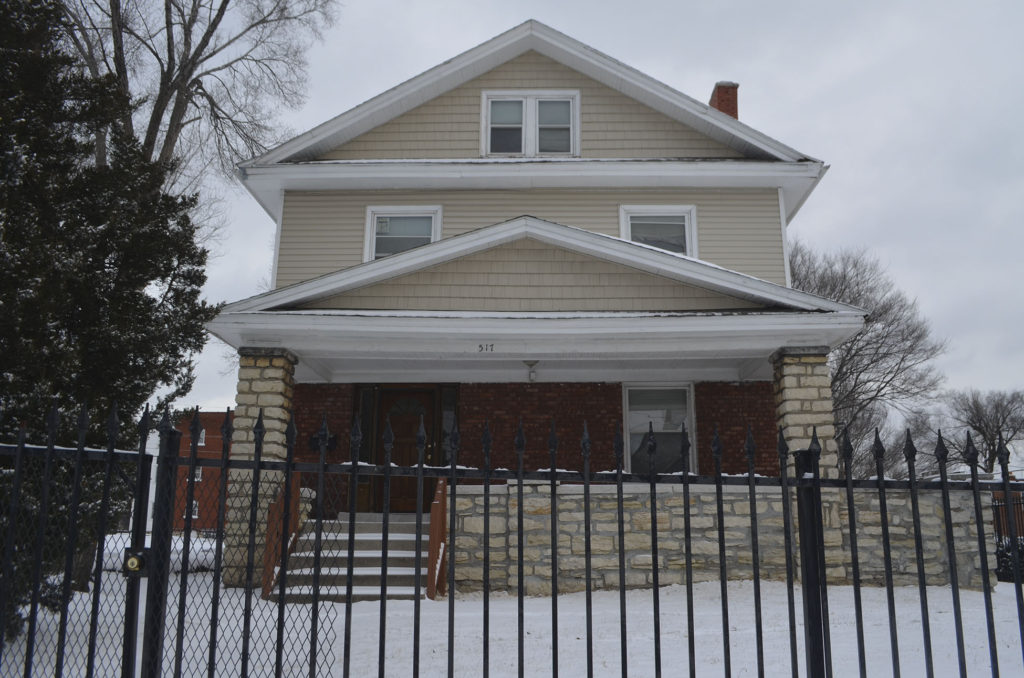
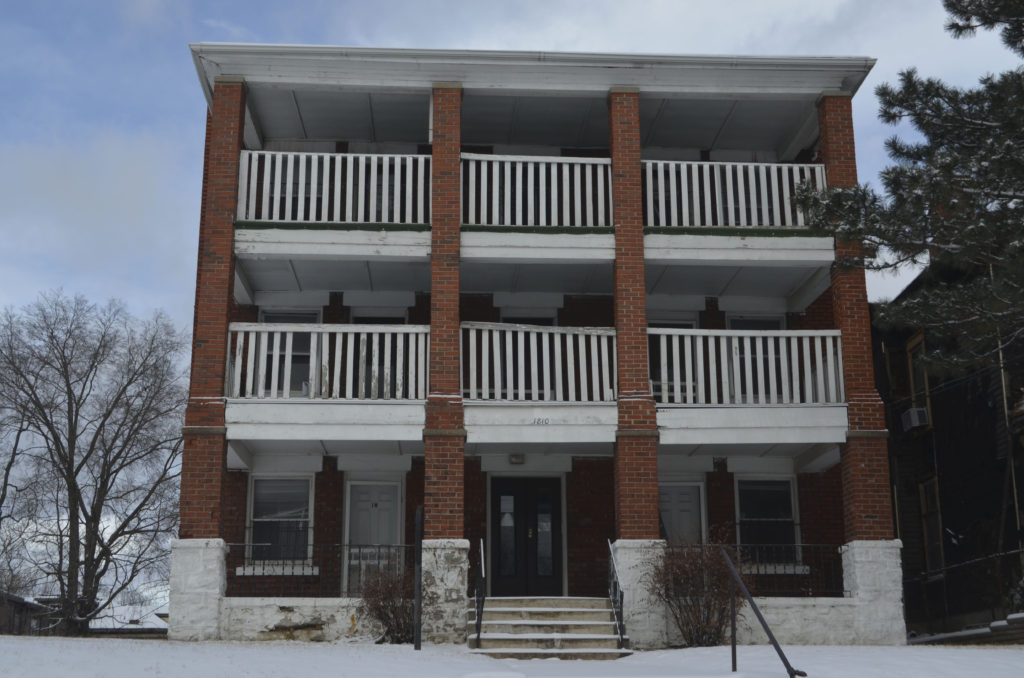
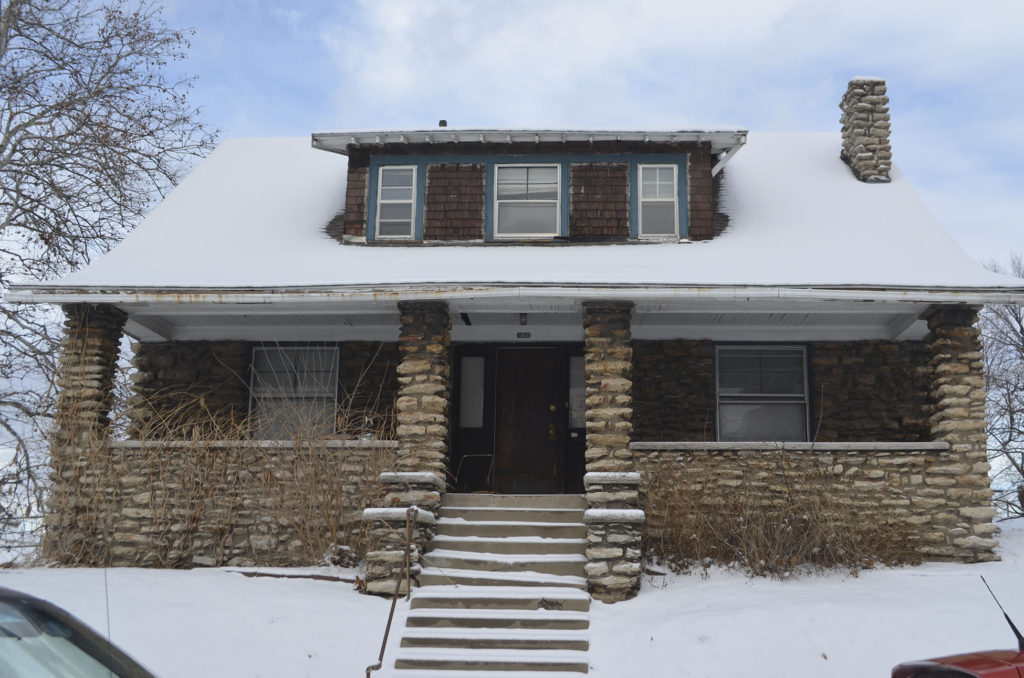


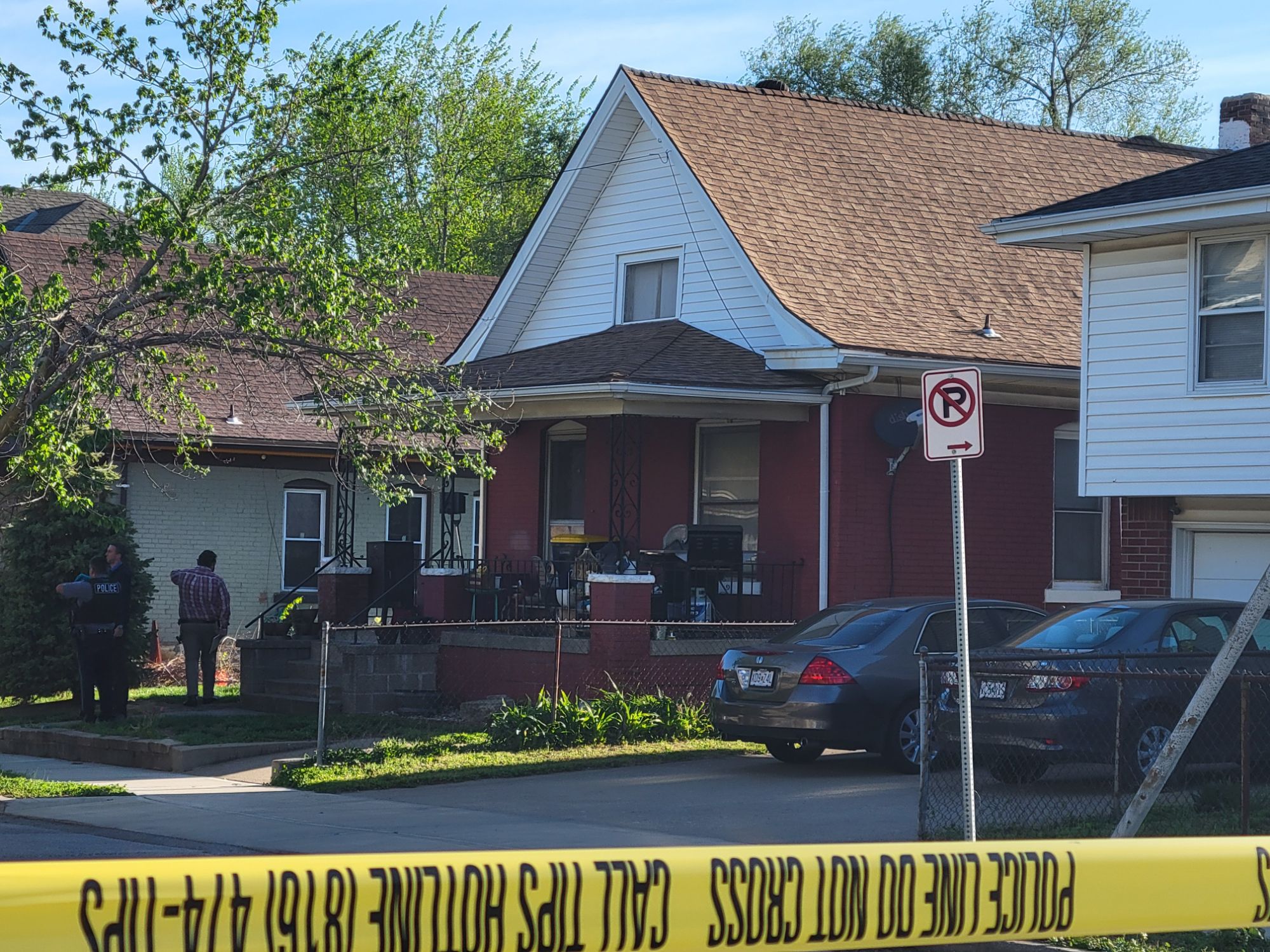
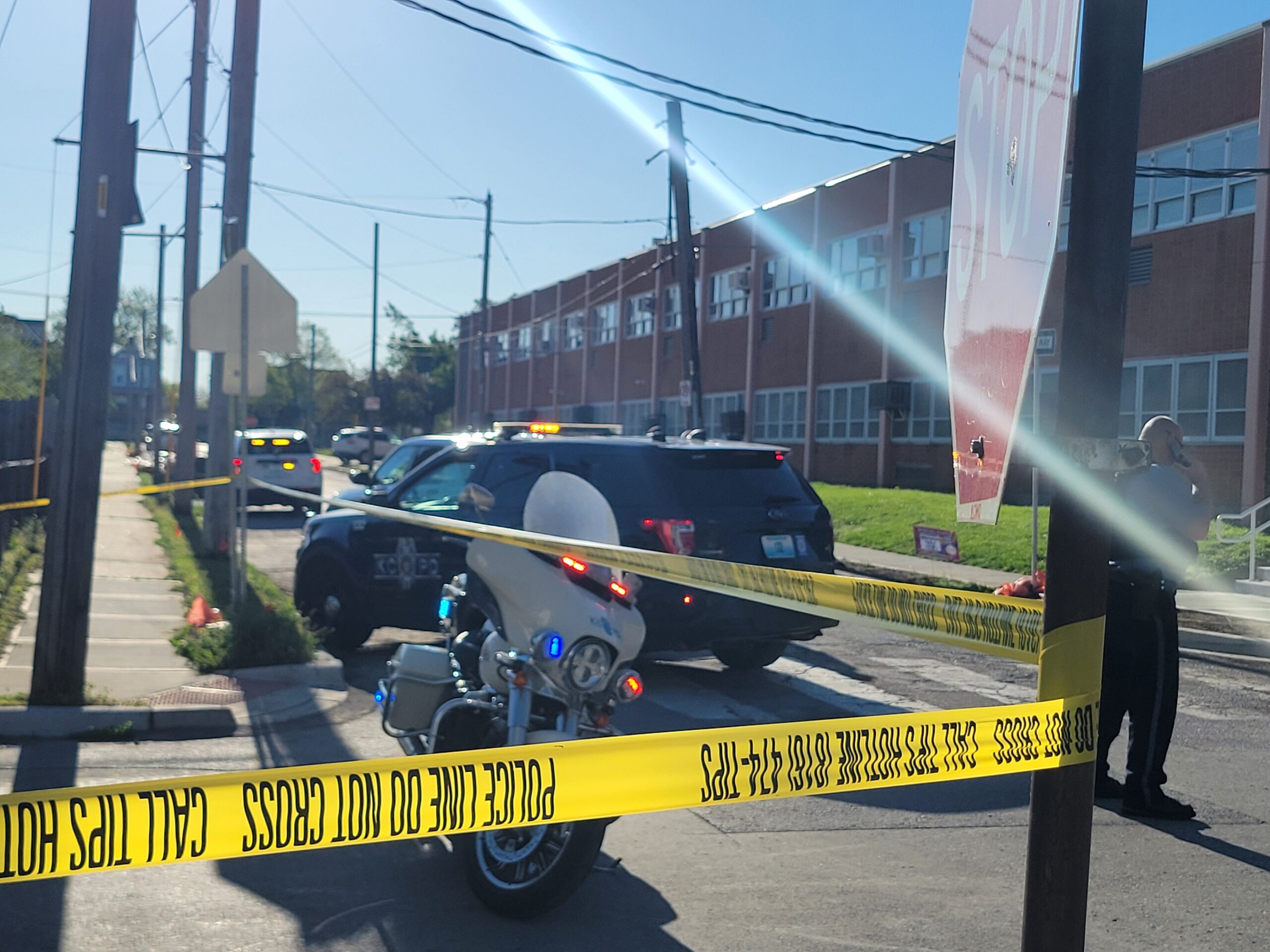















Comments are closed.